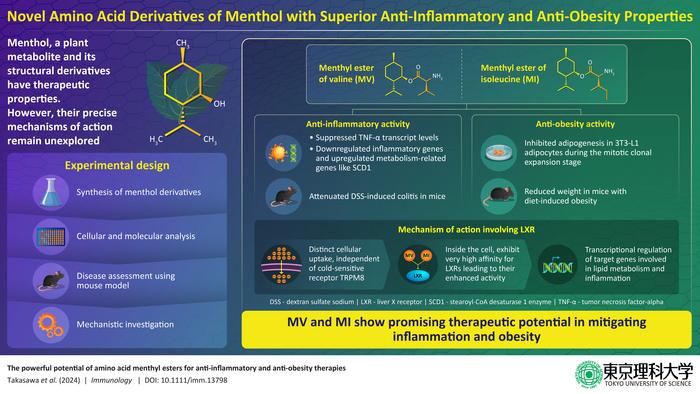A team of researchers led by Professor Gen-ichiro Arimura from the Tokyo University of Science, Japan, has developed and investigated menthyl esters of valine (MV) and isoleucine (MI), derived from the naturally occurring compound menthol. The study, published in the Immunology journal on May 08, 2024, sheds light on the exceptional anti-inflammatory and anti-obesity properties of these novel derivatives, surpassing those of menthol itself.
Unlocking the Potential of Menthol Derivatives
Menthol, a cyclic monoterpene alcohol found in various plants, particularly in the mint family, has long been recognized for its analgesic, anti-inflammatory, and anti-cancer effects. Inspired by the functional components of plants that contribute to human health, Prof. Arimura and his team set out to develop amino acid derivatives of menthol, replacing its hydroxyl group with valine and isoleucine.
Through in vitro cell line studies and experiments in mice, the researchers discovered that MV and MI outperformed menthol in anti-inflammatory assays, effectively suppressing 18 genes involved in inflammatory and immune responses. “The functional components of plants that contribute to human health have always intrigued me. Discovering new molecules from natural materials inspired our research team to develop these amino acid derivatives of menthol,” shared Prof. Arimura.
Unraveling the Mechanism of Action
The researchers delved deeper into the mechanism of action of the menthyl esters, revealing that the liver X receptor (LXR), an intracellular nuclear receptor, played a crucial role in their anti-inflammatory effects, independent of the cold-sensitive transient receptor TRPM8. Further investigation showed that the Scd1 gene, central to lipid metabolism, was upregulated by LXR, contributing to the anti-inflammatory and anti-obesity properties of MV and MI.
In mice with induced intestinal colitis, the anti-inflammatory effects of MV and MI were further validated, with suppressed transcript levels of Tnf and Il6 genes in an LXR-dependent manner. Additionally, the menthyl esters inhibited adipogenesis, specifically at the mitotic clonal expansion stage in 3T3-L1 adipocyte cells, and ameliorated diet-induced obesity in mice.
The unique advantages of menthyl esters, particularly their specific mechanisms of action and dual anti-inflammatory and anti-obesity effects, set them apart from other compounds currently being researched or used. “Although this study focused on their functions and mechanisms of action in diseases modeled after inflammation and obesity, we expect that these compounds will also be effective against a wide range of lifestyle-related diseases caused by metabolic syndrome, such as diabetes and hypertension, as well as allergic symptoms,” stated Prof. Arimura optimistically.
Keyword phrase: menthol derivatives with anti-inflammatory and anti-obesity effects


